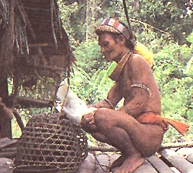When asked about my favourite part of Indonesia, I invariably reply West Sumatra.
The Minang culture of the province is noted for its matrilineal family structure, which is one reason for the spread of Padang restaurants throughout Indonesia ~ the menfolk leave to seek their fortunes elsewhere and are therefore much less insular in outlook than other groups. This could be one reason why the ubiquitous "Hello mister" is rarely heard there, although western visitors are much rarer than, say, in Yogyakarta or Bali.
I have regularly linked to Hotel Rimbo, an eco-tourism project being developed in Lubuk Sikaping just north of the Equator, which is the vision of a good friend of mine. When it is time to 'retire' from the fray here in Jakarta that's where I'll be and when this blog will cease. (Rimboass anyone?)
Following my post yesterday, I got to reminiscing about a visit made to the island of Siberut, a night's boat journey from Padang, the capital of the province, in July 1992 with son number one. At that time, there were already concerns about the raping of the forests of the island and the effect on the native hunter-gathers, the Mentawai.
One of the first Europeans to comment on the Mentawai Islands was Sir Thomas Raffles. Visiting in the last century when he was vice-governor of Benkulu, he wrote, in a letter to the Duchess of Somerset in 1821, "I made further discoveries in these Islands, where I found a population more likeable still and, if possible, still more ingenuous. If I continue in this direction, I may expect somewhere to find the Garden of Eden, and descendants of our first parents."
(There is an old map here.)
For the past century, attempts have been made to 'Christianise' the Mentawai, a process continuing today. In tandem with this process has been the attempt by successive governments to 'Indonesianise' these gentle people. The avowed intent was to 'modernise' this 'primitive' culture, although the real reason was surely to exploit the cheap timber and the potential for a coconut oil industry, requiring thousands of non-Mentawai immigrant workers.
When we visited, there were strong rumours that Suharto's youngest and most-hated offspring, Tommy, the convicted murderous criminal, was the malignant figure behind this rape of the fragile environment.
After 1950, when Indonesia gained independence, an all out assault on the old Mentawai culture began. Families were ordered to move from the jungle, from their communal homes, or 'uma' and into small modern houses with tin roofs; conversion to Islam or Christianity was ordered by Sumatran government decree and women were forcibly sterilized by doctors. It can only be described as an attempted genocide.
Most damaging to the culture as a whole, the shamans, who both symbolize and hold the secrets of the spirit traditions, were persecuted. Until the late 1990's a shaman encountering government officials was likely to have his head shaved to symbolically diminish his status; his rituals were banned; army units were sent into the forest to confiscate his 'magic boxes'; he was forced to wear clothes and uma were regularly burned down. Even tattoos, symbols of strength and power, were outlawed.
Read the full article by Alex Dick-Read.
Thankfully, there are now a number of NGOs concerned with their plight including the surfing community which, as I have weak ankles and appalling eyesight, I previously felt little kinship with. Two local expat-organised groups, SurfAid and Electric Lamb Mission are currently more focussed on relief efforts in Aceh although not without problems.






